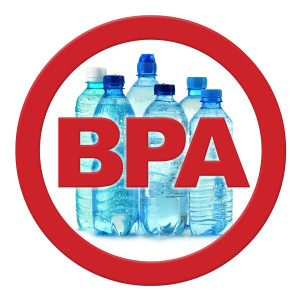BPA (Bisphenol-A) is a pervasive chemical found in plastics worldwide that is being increasingly recognized as a cause of adverse health effects. BPA is part of a class of chemicals known as Endocrine Disrupting Compounds (EDCs) that have especially damaging effects on our hormones and endocrine system, according to the World Health Organization’s recent report.
Long-term chronic exposure to EDCs is implicated in weight gain, obesity, diabetes, infertility, cancer, and neurological disease, and can adversely impact mood, cardiovascular function and metabolism. There are hundreds of animal studies linking BPA to health problems and a growing number of human studies now. For example, BPA used to line canned foods was shown in one recent randomized study to increase blood pressure.
Unfortunately, BPA is ubiquitous. Studies show that the overwhelming majority of people (95% in the United States) have detectable levels of BPA in their bodies.
Sources of BPA include plastic water bottles, linings of soda cans, linings of canned foods, and receipts including cash register and ATM receipts. An interesting study found that just consuming 1 bottle of Progresso soup led to an increase in body BPA levels of over 1000%!
What about BPA-free products? In these products, BPS is often used as a substitute for BPA. Unfortunately, research suggests that BPS also has endocrine-disrupting toxic effects and could be even worse than BPA because it is less biodegradable and may linger in the body longer. Further research is needed to find safer substitutes.
Until then, here are some steps you can take to reduce BPA exposure:
- Reduce usage of plastic water bottles. Use glass or stainless steel instead.
- Do not heat food in plastic containers in the microwave.
- Minimize canned food, or use canned food from companies that say they do not use BPA in the linings (Trader Joe’s, Eden Foods, etc.)
- Try not to excessively handle cash register receipts, or opt for electronic receipts.
- Reduce Saran wrap usage
- For pregnant women, infants, and children avoid food and beverages in plastic or in cans.
- Avoid plastic teething toys for infants and use fabric or alternative materials instead.
- Breastfeed your infant as long as possible (to avoid exposure from plastic milk bottles and infant formula packaging)
We cannot completely avoid BPA and other toxins, but making small, intentional changes in our diet and daily routine can significantly reduce our exposure over time and thus have positive benefits for our health.




[…] BPA – Health Risks and Dangers (and also avoid BPA-free products!) […]
Too many errors in this article. Example: “Minimize use of canned food from companies that say they do NOT use BPA in their can linings”. REALLY ?!
Those are exactly the cans we should maximize use of … NOT minimize use of.
Fantastic items from you, man. I’ve remember your stuff previous to and you are simply too wonderful.
I actually like what you’ve acquired right here, certainly like what you are stating and the
best way during which you assert it. You are making
it entertaining and you still care for to keep it smart.
I can not wait to learn much more from you. That is really a great site.